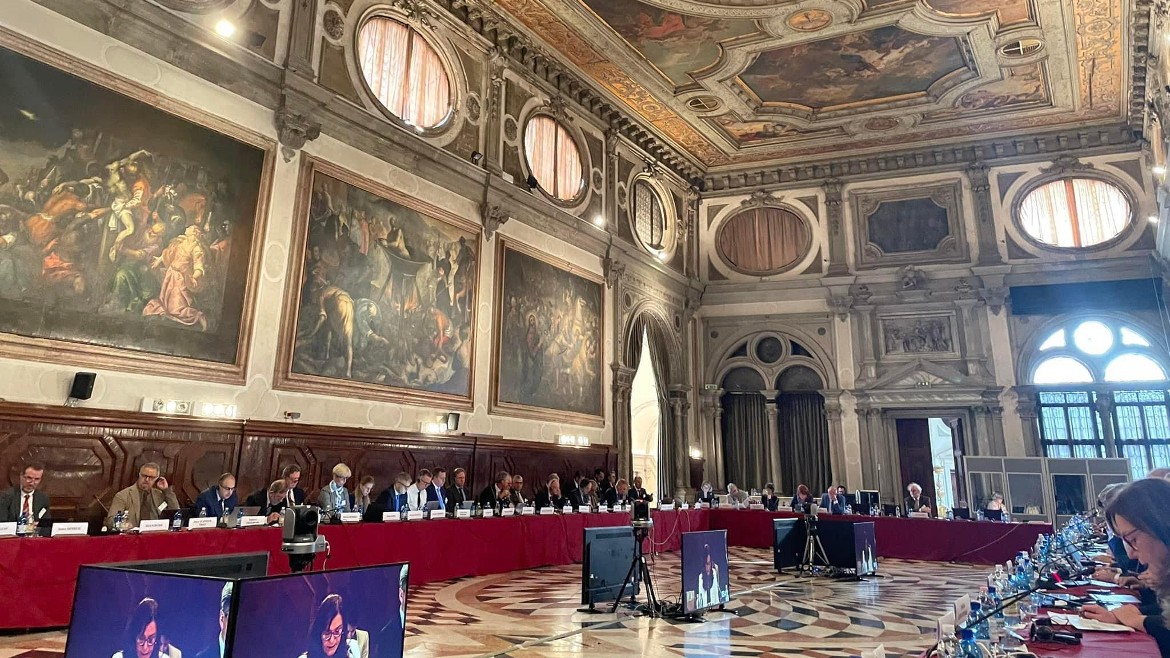The joint Amicus Curiae Brief by the Venice Commission and the Council of Europe’s Directorate General of Human Rights and Rule of Law (DGI) on certain questions related to the election and discipline of the members of the High Council of Justice of Ukraine was published. It was adopted by the Venice Commission in its plenary session on 21-22 October 2022.
The amicus curiae brief was requested by letter of 1 July 2022, by the Acting Chair of the Constitutional Court of Ukraine, Mr Serhyi Holovaty. The Venice Commission was asked to answer five questions.
See the full text here: https://www.venice.coe.int/webforms/documents/?pdf=CDL-AD(2022)023-e and the conclusion below:
V. Conclusion
54. This amicus curiae brief follows a line of opinions on judicial reforms including on an earlier draft version of the law that is being examined by the Constitutional Court of Ukraine. The lack of a holistic approach by the Ukrainian authorities, which was pointed out in these opinions, resulted in various, sometimes contradictory pieces of legislation. The implementation of some amendments was still unfinished when the new amendments were introduced. The Venice Commission and DGI are however aware of the grave challenges facing Ukraine at the moment. In view of the Russian attack against Ukraine it is understandable that instead of the holistic reforms the Commission has been advocating for years, only partial reforms are being pursued.
55. A recurrent theme in those opinions has been the concern as regards the functioning of the bodies of judicial governance, i.e. the HCJ (and its interrelationship with the High Qualification Council of Judges) including doubts as to the integrity of its members. The Commission and DGI have therefore emphasised the importance of “sequencing”: a judicial reform which does not tackle the functioning of the HCJ and the integrity of its members is doomed to fail. Against that backdrop, the establishment of an Ethics Council was considered “very welcome”.
56. The establishment of a procedure which could lead to the dismissal of a sitting HCJ member who is found to be unethical is not by itself contrary to the principle of independence.
57. When answering this request for an amicus curiae brief, the Commission and DGI draw on their previous opinions, most notably the Urgent joint opinion of the Venice Commission and DGI on the draft law on amendments to certain legislative acts concerning the procedure for electing (appointing) members of the High Council of Justice (HCJ) and the activities of disciplinary inspectors of the HCJ (Draft law no. 5068) (CDL-AD(2021)018). The main arguments from this opinion remain valid. In the light of the answers given above to the five questions from the Constitutional Court, the Venice Commission and DGI would however like to point out that the adopted Law No. 1635-IX, was further amended as compared to the draft law No. 5068, notably as concerns the introduction of a rule that results in the automatic dismissal of a current member of the HCJ if the appointing body does not either confirm or reject the decision of the Ethics Council finding that member non-compliant with the criteria of professional ethics and integrity.
58. The inclusion of international experts in the Ethics Council may be difficult for the judges and members of the HCJ to accept but it is important to combat the scourge of corruption without generating instability and more corruption. It is foremost corruption that weakens the sovereignty of the state.
59. In giving a global evaluation, it is also necessary to take into account all procedural guarantees as stipulated (inter alia) in the Rules of Procedure and Methodology of the Ethics Council (see for example item 3.14), and the fact that judicial review is available. A priori, the decisions of the Ethics Council seem to follow these rules and guarantees.
60. As such, the Ethics Council therefore does not seem to endanger judicial independence or the sovereignty of Ukraine. However, the limit of three months for the electing or appointing bodies and the automatic dismissal of sitting members if these bodies do not act upon the recommendation of the Ethics Council within this deadline appears problematic.
61. As concerns the current situation in the HCJ, it would seem that the loss of quorum within the HCJ did not result from decisions of the Ethics Council but from the mass resignation of the members of the HCJ. Even if the Constitutional Court were to establish the unconstitutionality of some provisions, this should not affect the position of those members who resigned voluntarily and whose integrity the Ethics Council could not even assess.
62. The Venice Commission remains at the disposal of the Constitutional Court and the Ukrainian authorities for further assistance in this matter.




